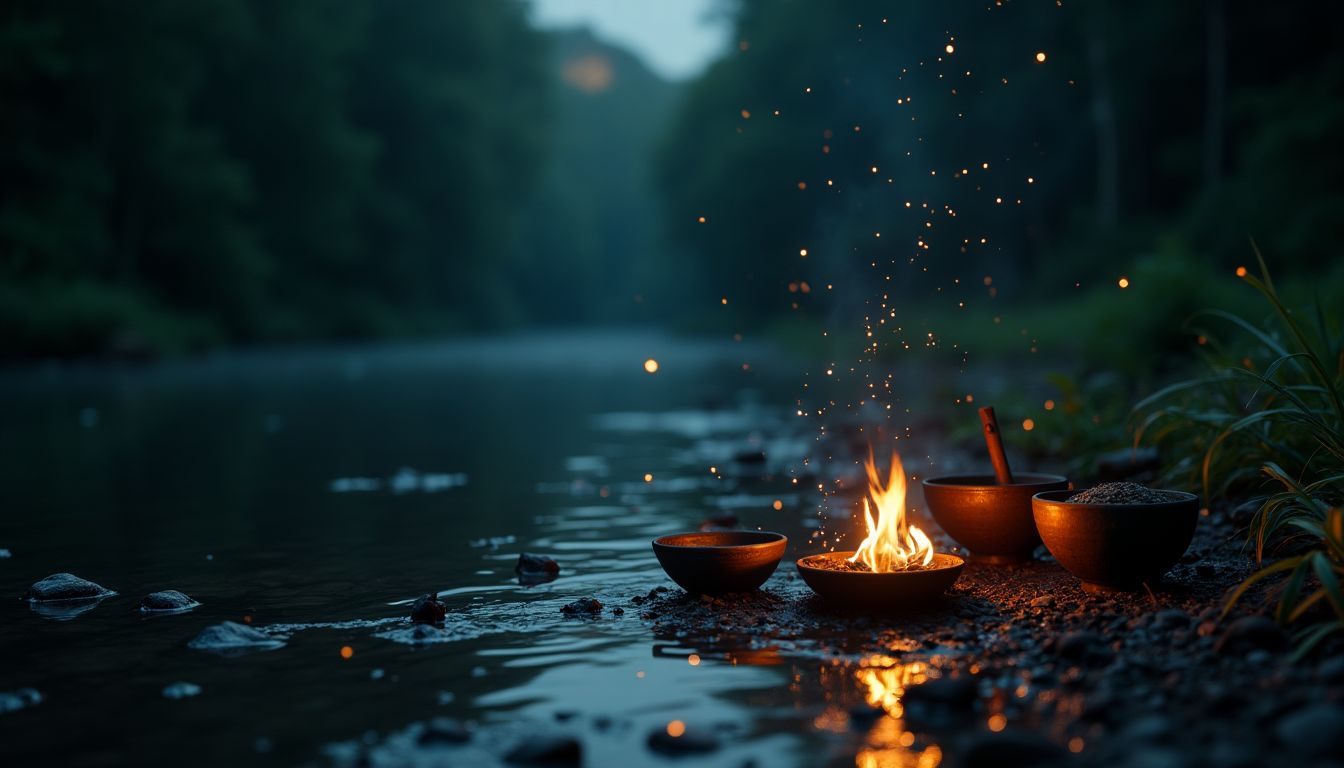The Plague's Arrival
On a humid morning, a procession of priests arrived at her door, their feathered headdresses wilting from sweat. News of a mysterious disease spreading through the farmlands to the west had alarmed the city's high priest, Tlotzin—whose power was rivaled only by the king himself. It began with fevers but progressed into pustules that burst, painting their victims in agony as their flesh rotted. Crops in the infected areas wilted inexplicably. The priests brought this news to Citlali, speaking in hushed tones of omens from the gods.
"The stars have not spoken ill of late," replied Citlali, her voice soft but unyielding, like the winds before a storm. Lifting her reed pouch of tools and textiles dyed with celestial symbols, she instructed the priests, "Lead me to the sickness."
The priests carried her to the western farmlands without delay. At first glance, it was worse than they had described. The air was pungent with the smell of decay—not just human but the earth itself, as though the land had soured. Layers of flies clung to the walls of kitchens, and the cries of the sick mingled with the wailing of the bereaved. That evening, after tending to the first patients, Citlali made her camp beside the river, staring into its dark, still waters, as the stars silently reflected above her.
The Discovery
Over the coming days, Citlali studied the sick and instructed the locals to keep detailed accounts of their last meals, water sources, and tasks. Though charts were not a practice common to their people, they complied out of sheer desperation, their respect for Citlali running deep. Supplies brought to her from the city included obsidian bowls, cacao dyes, mustard flower oils, and dried fish eggs—each for rituals and remedies she rarely divulged to others.
One humid evening, Citlali carefully inspected one patient’s drinking jar, dusting fine powder from its rim. Rubbing the powder between her fingers, her golden-flecked eyes widened. "Not the wrath of the gods," she murmured to herself, "but a poison of water caves."
Gathering the priests and farmers, she explained what she understood. Using her hands to draw on the dusty ground, she mapped their drinking wells to the infected farms, noting patterns in contamination possibly caused by sediment disturbed deep beneath the earth’s surface. "The source is within the bones of the land. Water tainted by heavy obsidian salts—it consumes vitality for its own preservation."
The Cure
Citlali worked tirelessly through nights lit by games of starlight and fireflies. Mixing strange combinations of ground cacao husks, maize paste, and crushed obsidian into paste, she created concoctions meant to draw the "unseen weariness" from within the body. Boiling obsidian shards in herbal teas, she instructed the farmers on purifying the future wells without angering Tlaloc, their storm god and keeper of waters.
The Ritual of the Cleansing Waters
Citlali’s remedies brought some relief, but the plague continued to claim lives. Her concoctions slowed the disease's progress, yet it was clear that a deeper purification was needed—not just for the afflicted but for the land itself. The poisoned water had seeped into the soil, spreading sickness even to those who had not yet consumed it.
On the fifth night, as the moon hung low and red on the horizon, Citlali gathered the priests and farmers at the edge of the largest infected well. The air was heavy with moisture, the scent of decay mingling with the sharp tang of burning incense she had prepared. At the center of the gathering, she placed an altar of river stones, obsidian shards, and maize husks.
"The land is wounded," Citlali said, her voice carrying over the silent crowd. "And it will not heal unless we offer it something in return. The poison must be drawn out, and the gods must be appeased."
She instructed the priests to lead a chant, a prayer to Tlaloc, the storm god, and Chalchiuhtlicue, the goddess of rivers and purification. Their voices rose in unison, a rhythmic, hypnotic melody that seemed to blend with the rustling of the trees and the murmuring of the distant river.
Citlali prepared a ritual paste, mixing ground obsidian with cacao and mustard flower oil. She painted the symbols of life and renewal onto the foreheads of the sick and the hands of the healthy, forming a bond between them. The paste shimmered under the firelight, as though it carried the light of the stars themselves.
She then took a large obsidian shard, its edges sharp and gleaming like frozen fire. Dipping it into the tainted well, she spoke words only she understood, invoking the spirit of the land to accept the offering. The shard began to glow faintly, a pale blue light that pulsed like a heartbeat.
The Healing Storm
As the ritual reached its crescendo, the wind began to stir, carrying with it the faint scent of rain. Clouds gathered above, swirling in an ominous dance. The priests hesitated, their chants faltering, but Citlali raised her hands and steadied them with a single glance.
"Do not stop," she commanded. "The gods are listening."
A deafening crack of thunder split the air, and the first drops of rain began to fall. The rain was unlike any they had seen before—thick and cold, smelling of minerals and earth. It struck the poisoned wells, hissing as though cleansing the taint with its touch.
The glowing obsidian shard in Citlali’s hands pulsed brighter, its light spreading across the surface of the well. The water within began to swirl, its dark hue fading into clarity as the rain poured harder. The villagers watched in awe as the wells seemed to come alive, their poisoned depths purging themselves under the combined power of the storm and Citlali’s ritual.
The rain continued until dawn, soaking the earth and washing away the rot. When the storm finally passed, the air was fresh and clean, and the land seemed to breathe once more.
The Aftermath
In the days that followed, the villagers noticed the changes. The sick began to recover, their fevers breaking and their wounds healing. The crops, once wilted and lifeless, began to show signs of renewal, their leaves vibrant with new growth. The wells, once the source of death, now ran clear and pure, their waters cool and sweet.
Citlali stayed with the villagers for several weeks, teaching them how to maintain the purity of their water and honor the balance of the land. She showed them how to use obsidian shards as talismans, embedding them near their wells to ward off future contamination.
Word of her success spread quickly, reaching the ears of the high priest Tlotzin and even the king himself. Citlali was summoned back to the city, where she was hailed as a savior, a healer whose wisdom had bridged the worlds of the divine and the mortal.
Yet, despite the accolades, Citlali remained humble. "The land heals itself," she told the king. "I only listened to its voice and acted as its hands."
A Legacy of Balance
Years later, long after Citlali had passed, the villagers still told her story. They called her The Obsidian Healer, a name that became legend among their people. Her teachings lived on, passed down through generations, a reminder of the delicate balance between humanity and the earth.
And in the wells of the western farmlands, the obsidian shards remained—silent sentinels, their edges worn smooth by time but their power undiminished. They stood as a testament to the healer who had understood that even the sharpest blade could be a tool of life when wielded with wisdom and compassion.
The Source...check out the great article that inspired this amazing short story: OpenAI's New AI Model Stuns Even Doctors!
Disclaimer: This article may contain affiliate links. If you click on these links and make a purchase, we may receive a commission at no additional cost to you. Our recommendations and reviews are always independent and objective, aiming to provide you with the best information and resources.
Get Exclusive Stories, Photos, Art & Offers - Subscribe Today!

























Post Comment
You must be logged in to post a comment.